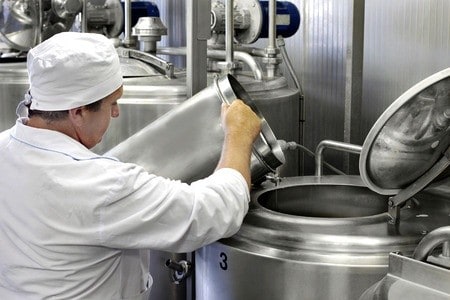
Many people mistakenly believe that for religious Jews with milk, unlike with meat, everything is simple: it is sufficient to make sure that it is produced from the kosher animal and a required amount of time as passed after having a meal that contained meat – and that’s it – you can drink it for your pleasure. However, Jews would not be Jews if such important issue would be so easy.
In the tractate Avodah Zorah (35b), there is indicated a list of goods which could be used by Jews for getting profit (e.g. to sell it to non-Jews), but it is prohibited to eat them. First in that list is “milk which was milked by a non-Jew in not presence of a Jew”. It is explained by the fact that the non-Jew, according to sages, could add non-kosher milk into kosher one, for example, donkey milk, horse milk or even pig milk.
Since that prohibition got a completely rational explanation, latest authorities argued whether it is valid in the situation when such is not possible – e.g. if a non-Jew does not have milk non-kosher animals. As usual, opinions were divided. Sephardic rabbi Davin Ibn Zimra (1479-1573) declared that in such case it is absolutely possible to drink milk brought to the market by any dairymaid. To the same conclusion came an Amsterdam rabbi Hizkiyahu da Silva (by Hadash, Jore Dea 115). However, others rabbis did not agree with that. For example, Chatam Sofer (1762-1839) stated that the ban on non-Jewish milk is considered as absolute and does not depend on circumstances. The same views shared a well known Galician halachist r. Yechiel Epstein (Aruch HaShulchan, Jore Dea 115), and also r. Shlomo Ganzfried (Kitzur Shulchan Aruch 38:13).
Transition to industrial production of milk and dairy not only faced rabbis with a number of new obstacles, but lead to emergence of original halachist solutions, also in regards to non-Jewish milk. For example, a well known Israeli rabbi Avraham Yeshayahu (Chazon Ish) allowed any milk produced by the factory method. According to rabbi, the government regulation of production could be considered as a sufficient guarantee, that technology will not be undermined and kosher milk is not mixed with non-kosher. R. Moshe Feinshtein came to the same conclusion. However, not everyone agreed with that opinion.
Nowadays different communities adhere to a very different milk politics. Hasidic and Chabat and the majority of ultra-orthodox drink milk only milked by a Jew or in the presence of the Jew. On the other hand, Orthodox Union (OU) consider it acceptable to consume processed milk. Therefore, on the question “to drink or not to drink” the answer would be – depending on your community belonging and its customs.
- Is it kosher? app
- Android – https://play.google.com/store/apps/details?id=com.kosherdev.koshergator
- iOS – https://itunes.apple.com/WebObjects/MZStore.woa/wa/viewSoftware?id=855252975&mt=8
- Amazon – http://www.amazon.com/KosherDev-Is-it-Kosher/dp/B00I8S43HW/
- Blackberry – https://appworld.blackberry.com/webstore/content/59962547
- WinPhone – https://www.microsoft.com/en-us/store/apps/is-it-kosher/9nblggh6cs0w